ceil()函数的应用-hdu1065
题目链接:http://acm.hdu.edu.cn/showproblem.php?pid=1065
题目描述:


floor(x) is the largest integer not greater than x , 也就是,floor(x) 返回的是小于等于x的所有整数中最大的整数,简单的说,就是去掉x的小数部分的整数
ceil(x) is the smallest integer not less than x,也就是,ceil(x) 返回的是大于等于x的所有整数中最小的整数,简单的说,就是如果x是整数,则返回该数,如果x不是整数,则不管小数部分是多少,都进一位然后返回。
例如:
floor(3.2)= 3;
ceil(3.2)= 4;
floor(4)= 4;
ceil(4)= 4;
代码实现:
#include<cstdio> #include<iostream> #include<cmath> #include<algorithm> #define PI 3.1415926; using namespace std; int main() { double x,y; int T;scanf("%d",&T); for(int i=1;i<=T;i++){ scanf("%lf%lf",&x,&y); double square=(x*x+y*y)*PI;//房子所在下标所围成的圆的面积(x*x+y*y)为R^2 double year; year=ceil(square/2/50);//房子所在地是处在半圆中,所以square得除以2,每年的淹没速度为50平方米,所以再除以速度向上取整得出最终结果 printf("Property %d: This property will begin eroding in year %d.\n",i,(int)year); } printf("END OF OUTPUT.\n"); return 0; }




 浙公网安备 33010602011771号
浙公网安备 33010602011771号